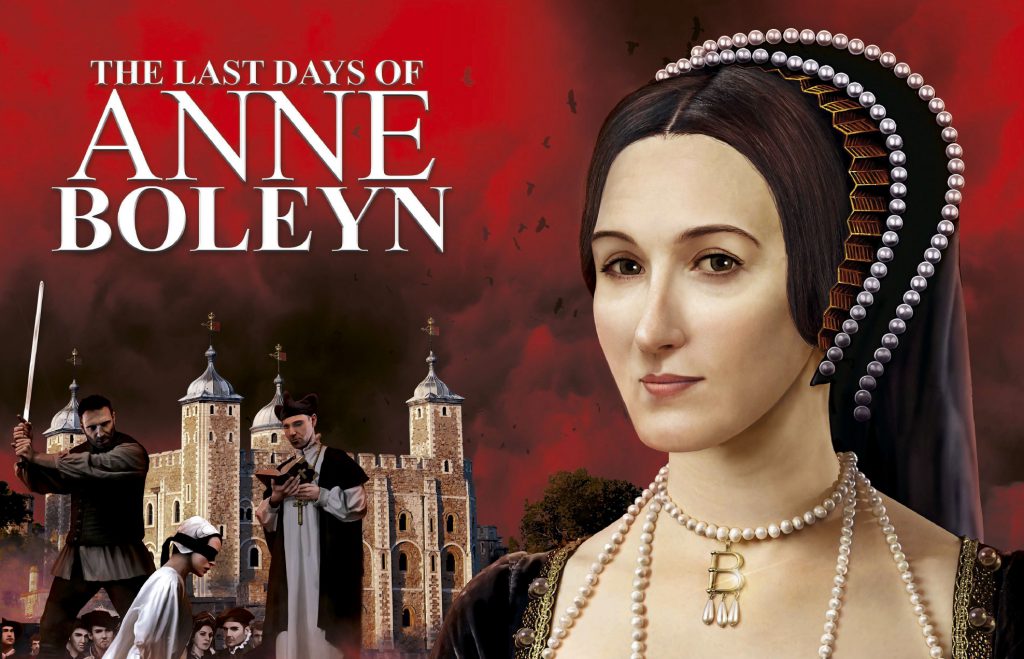The Last Days of Anne Boleyn: Anne Boleyn is one of the most famous and controversial women in British history. In 1536, she became the first queen in Britain’s history to be executed. The brutal speed of her downfall and the astonishing nature of the charges against her – treason, adultery, even incest – make her story shocking even to this day.
Yet whilst we know how Anne died, the story of why she had to go and who authored her violent end has been the subject of fiery debate across six centuries. In a radical new approach to televised history, a stellar cast of writers and historians, including Hilary Mantel, David Starkey, Philippa Gregory and others, battle out the story of her last days and give their own unique interpretations of her destruction.
For some reason, the story of Anne Boleyn’s downfall inspires extraordinarily passionate, opinionated disagreement. There’s just the right amount of evidence to keep us guessing – enough to lead to great speculation and several almost-sustainable theories, but ultimately not enough to nail any one entirely. Although we were all interviewed separately, the film has been brilliantly edited to make our debate seem live. If it had been in practice, I doubt you would have been able to make out anything over the ardent babble!
There’s also another interesting natural tension in the programme. Historians and novelists use evidence differently. Historians feel bound by the precise demonstrable facts of the documents. Novelists can weave empathetic visions into the silences between those facts. Both have their place.
The Last Days of Anne Boleyn
Anne Boleyn was Queen of England from 1533 to 1536, as the second wife of King Henry VIII. The circumstances of her marriage and of her execution by beheading for treason and other charges made her a key figure in the political and religious upheaval that marked the start of the English Reformation. Anne was the daughter of Thomas Boleyn, 1st Earl of Wiltshire, and his wife, Lady Elizabeth Howard, and was educated in the Netherlands and France, largely as a maid of honour to Queen Claude of France. Anne returned to England in early 1522, to marry her Irish cousin James Butler, 9th Earl of Ormond; the marriage plans were broken off, and instead she secured a post at court as maid of honour to Henry VIII’s wife, Catherine of Aragon.
Early in 1523, Anne was secretly betrothed to Henry Percy, son of Henry Percy, 5th Earl of Northumberland, but the betrothal was broken off when the Earl refused to support their engagement. Cardinal Thomas Wolsey refused the match in January 1524 and Anne was sent home to Hever Castle. In February or March 1526 Henry VIII began his pursuit of Anne. She resisted his attempts to seduce her, refusing to become his mistress, as her sister Mary had previously been. Henry soon focused his desires on annulling his marriage to Catherine so he would be free to marry Anne. Wolsey failed to obtain an annulment of Henry’s marriage from Pope Clement VII, and when it became clear that Clement would not annul the marriage, Henry and his advisers, such as Thomas Cromwell, began the breaking of the Catholic Church’s power in England and closing the monasteries and the nunneries. In 1532, Henry made Anne the Marquess of Pembroke.
Henry VIII
Henry VIII was King of England from 22 April 1509 until his death in 1547. Henry is best known for his six marriages, and for his efforts to have his first marriage (to Catherine of Aragon) annulled. His disagreement with Pope Clement VII about such an annulment led Henry to initiate the English Reformation, separating the Church of England from papal authority. He appointed himself Supreme Head of the Church of England and dissolved convents and monasteries, for which he was excommunicated by the pope. Henry is also known as “the father of the Royal Navy” as he invested heavily in the navy and increased its size from a few to more than 50 ships, and established the Navy Board.
Domestically, Henry is known for his radical changes to the English Constitution, ushering in the theory of the divine right of kings in opposition to papal supremacy. He also greatly expanded royal power during his reign. He frequently used charges of treason and heresy to quell dissent, and those accused were often executed without a formal trial by means of bills of attainder. He achieved many of his political aims through the work of his chief ministers, some of whom were banished or executed when they fell out of his favour. Thomas Wolsey, Thomas More, Thomas Cromwell, Richard Rich and Thomas Cranmer all figured prominently in his administration.
Henry was an extravagant spender, using the proceeds from the dissolution of the monasteries and acts of the Reformation Parliament. He also converted the money that was formerly paid to Rome into royal revenue. Despite the money from these sources, he was continually on the verge of financial ruin due to his personal extravagance, as well as his numerous costly and largely unsuccessful wars, particularly with King Francis I of France, Holy Roman Emperor Charles V, King James V of Scotland and the Scottish regency under the Earl of Arran and Mary of Guise. At home, he oversaw the legal union of England and Wales with the Laws in Wales Acts 1535 and 1542 and was the first English monarch to rule as King of Ireland following the Crown of Ireland Act 1542.




